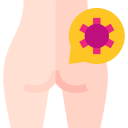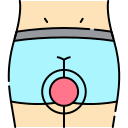-
 Call Now:
8010 552 552
7595 838 844
Call Now:
8010 552 552
7595 838 844
-
 Email Me:
clinicahealthkolkata@gmail.com
Email Me:
clinicahealthkolkata@gmail.com
As explained by the piles doctor in Kolkata, piles or haemorrhoids are a swollen collection of veins and tissues in your anus and lower rectum. Piles vary in size and can be located inside or outside the anus. Piles situated at 2 and 4 centimeters above the anal opening are known as Internal Hemorrhoids. The ones found on the outside edge of the anus are known as External Haemorrhoids.
Piles or Haemorrhoids can be classified into four grades – as discussed by the best doctor of piles




Dr Purnendu Bhowmik, the best piles doctor in Kolkata, lists the symptoms an individual with piles may experience. Typically, piles symptoms are not a cause of concern. The issue usually resolves on its own within a few days.
These symptoms can, however, turn severe and cause significant health issues. The severe symptoms include –
If you have bleeding during passage of stool or you have piles that does not improve even after a week of home care, talk to the best piles surgeon in Kolkata. (Do not assume every per rectal bleeding to be due to hemorrhoids, especially if it is associated with change in bowel habit and or change of stool color and/or consistency. Bleeding in your rectum may occur with other conditions, including colorectal cancer and anal cancer.)
The best way you can prevent piles is by avoiding constipation and by keeping your stool soft. You can follow these tips:
 Eat high-fiber foods
Eat high-fiber foods Drink plenty of fluids
Drink plenty of fluids Exercise
Exercise Consider fiber supplements
Consider fiber supplements Avoid long periods of sitting
Avoid long periods of sitting Don’t strain
Don’t strainSmall piles or haemorrhoids may disappear without any treatment within a few days. But, larger piles need intervention to cure. If you have symptoms and have not improved with home care within a few days, it is best to see a doctor for piles treatment in Kolkata.
If left untreated, piles or hemorrhoids can increase in size, upgrade and protrude out of the anus to cause irritation, severe bleeding and other severe complications. Moreover, if you avoid being examined by a doctor, you may miss other disease which might sometimes present as piles.
Fortunately, piles are treatable and curable if managed properly.
Yes. Laser procedure for piles is absolutely safe in the hand of a qualified & well trained laser surgeon.
Hemorrhoid laser procedure (LHP) is a new technique in which haemorrhoidal arterial flow feeding the haemorrhoidal venous plexus is stopped by laser coagulation. Laser piles surgery, when applicable, is preferable over other form of treatment as it not only is a bloodless & painless procedure but also provides quick recovery.
Laser Babasir treatment, a term used for piles or haemorrhoid surgery, is painless or in some cases, minimally painful.
Hemorrhoids do not occur due to a single causative factor, says the best laser surgeon in Kolkata. Most often, however, they are caused by an increased pressure on the anal canal. This can be due to:
Dr Purnendu Bhowmik, the best laser Piles surgeon in Kolkata, lists why you should choose laser piles surgery.
| Sl No. | Factors | Conventional Surgery | Laser Surgery |
|---|---|---|---|
| 1 | Operative Time | 45 mins | 15 mins |
| 2 | Hospital Stay | 2-3 Days | Day Care |
| 3 | Recovery | 2-3 Weeks | 2-3 Days |
| 4 | Bleeding | Moderate | Bloodless |
| 5 | Pain | Moderate | Painless |
| 6 | Relief of Symptoms | Takes 2-3 Weeks | Quick (within days) |
| 7 | Chance of Infection | Moderate to High | Minimal |
| 8 | Post-op Anal Stenosis & Constipation | High | No |
| 9 | Recurrence | High | Minimal |

I am thankful to Dr.Purnendu for curing my piles problem. I was frightened with open
surgery of piles as it may be very painful. After a lot of research I finally chose
Dr. Purnendu for laser piles surgery. It was as good an experience as committed. May he
continue his good work for long. Thank you doctor

I had multiple lumps on my foot due to an infection in my veins. Dr Purnendu Bhowmik
diagnosed the problem in the first appointment only. Finally, after 3 days he did laser surgery. Now I am completely fit. Thank you very much Dr Bhowmik to cure my leg problem. Highly recommended.

I have gone to him for UTI. He has cured it with single medicine. But the attracting part was he is not at all money making mind. He treats patients with good care and clear each and every doubt. He gave us near about half an hour time to clear our doubts. First
time I see any doctor with such a dynamic approach. Highly recommended

Taken treatment & done surgery under Dr Purnendu Bhowmik for Piles & Fissure is a
great experience. I am quite better now. I must recommend others for Laser surgery under Dr like him. Thank u very much..
Pressure in the lower rectum is the leading cause of Piles. Dr Purnendu Bhowmik, a piles specialist doctor in Kolkata, explains that when the blood vessels in the rectum and around the anus expand under pressure, it swells and bulges, forming piles.
Conditions which facilitate the development of Piles are –
A piles doctor will usually ask these five questions to evaluate whether a person may have piles –
Upon asking these questions, if the doctor suspects piles, a physical examination will be carried out.
There are many treatment options for piles, says Dr Purnendu Bhowmik, the best piles surgeon in Kolkata.
Upon piles diagnosis, a piles doctor will initially recommend some lifestyle changes to manage the symptoms.
Diet: Constipation is one of the primary causes of piles. Therefore, a change in diet will keep stools soft and facilitate bowel movement. This involves eating more fibre such as fruits and vegetables, or primarily eating bran-based breakfast cereals.
Water consumption should also be increased and it is best to avoid caffeine.
Body weight: Losing weight helps reduce the severity of piles. Doctors, therefore, recommend exercising as one of the leading therapies for piles.
Over the counter medications like painkillers, ointments, creams, and pads can help manage piles symptoms. If a person suffers from constipation, laxatives will also be prescribed by the piles doctor.
Mon to Sat: 8 am – 5 pm, Sunday: CLOSED